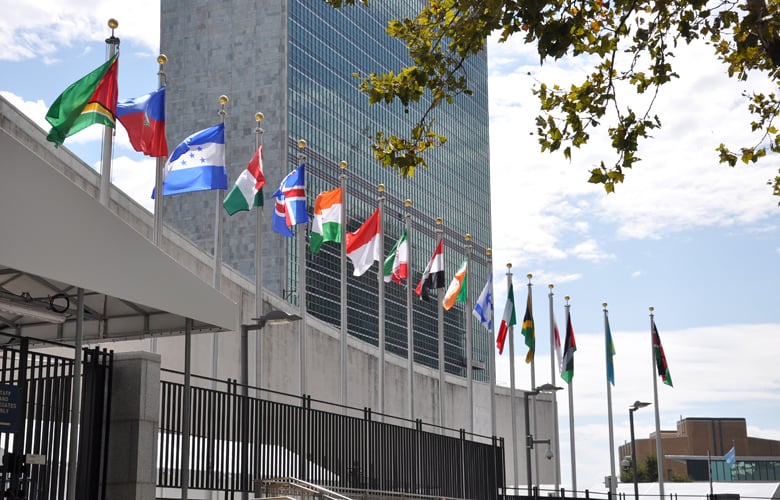Confrontation to UN Security Council for sea zones
With the exchange of positions, but also a common commitment to diplomacy and dialogue, Greece’s permanent representative, Ambassador Evangelos Sekeris, and his Libyan counterpart, Ambassador Taler Mohammed al -Sun, were placed on the issue of the Limulation of the Sea Council. UN For Libya.
Greece’s permanent representative, in his position, referred, inter alia, to the recent meeting of the International Berlin Process Monitoring Committee, emphasizing the importance of widespread participation of neighboring states to strengthen international efforts in the Libya.
It reiterated the Greek side’s intention for a constructive dialogue with Libya on all bilateral issues, including the demarcation of the maritime zones.
“We are ready to participate in a constructive dialogue to address all issues with our Libyan interlocutors,” He said, adding that “statements or actions moving in the opposite direction are obviously counterproductive.” “The last thing our region needs in this hectic period is a new outbreak of tension,” Mr Sekeris noted.
For his part, Libya’s permanent representative, Ambassador Taher Mohammed al -Sun, said in his position that “diplomacy is the solution in such cases and Libya always extends to cooperation for international and regional cooperation”. He pointed out to Mr Sekeris that Libya did not make any “provocation”, noting that “The challenge exists when you announce that you will investigate in a disputed area.”
At the same time, he stressed that “even now, despite the divisions, the authorities of Western and Eastern Libya were united and issued joint statements condemning such acts.”
“I totally agree with you, dear colleague, that diplomacy must have the first say and we must make use of the historical links between our countries to resolve it and other issues,” Libyus said a permanent representative.
Mr Sekeris returned, exercising the right to answer to clarify that “if there was no mistake in the translation of Arabic, in his statement there was no reference to a challenge” (a term used by the Libyan side) and pointed out that “I said that we should have the obvious, that we should solve it, zones. So I believe that through cooperation, through dialogue, this can be achieved. “
Libyan a permanent representative folded by saying that “I realized that in your statement you said that any provocative statements would not help diplomacy. And that’s why I say we didn’t try to provoke you with our statements. We want diplomacy. The action that happened was what triggered them all. We are friends and we will find ways to resolve this issue, ”re -confirming the common intention of preserving channels of communication and diplomatic cooperation despite existing disagreements.
The meeting was held amid continuing processes under the United Nations to promote a political solution in Libya, as well as amid international concerns about stability in the wider region.
Libya Secretary -General’s special representative Hannah Tete presented extensive information on political, economic and humanitarian developments in the country, noting that Libya is “at yet another crucial crossroads” in its course to national unity, democracy and stability.
Mrs Tette began welcoming the recent re-launch of the international Berlin process for Libya (IFC-L) on June 20 in Berlin and stressed that the meeting marked a “significant shift towards the rejuvenation of international coordination”.
Referring to the situation on the field, Mrs Tete described that, following the armed conflict in Tripoli in May, UNSMIL came into extensive contacts with political and military actors, tribal leaders, civil society and international partners to prevent new violence. He noted that after this involvement, the Presidential Council set up on May 18 May “to monitor the truce, to facilitate a permanent ceasefire and the protection of civilians”.
On June 4, the establishment of a Temporary Security Committee and Military Settlements, responsible for the establishment of peace and the reorganization of forces in Tripoli, was followed. These actions have led to the departure of heavy armed forces from the central arteries of Tripoli until June 11 and their replacement by police and military police. However, he warned that “the truce remains fragile and the overall state of safety unpredictable”.
With particular concern, Mrs Tete said that the May clashes caused dead and injured civilians as well as serious damage to critical infrastructure, such as hospitals, universities and prisons. He expressed particular concern about the “discovery of group tombs in the Abu Slim area”, citing evidence of serious human rights violations, such as “out -of -court executions, torture and disappearances of persons, alleged state security services”.
The presence of charred relics, unknown bodies in the funerals and illegal detention centers, Mrs Tete said, “the need to reform the security sector with respect for human rights”.
He noted that the ongoing influx of weapons has led to “accumulation of heavy weapons and ammunition warehouses into residential areas, with serious dangers for citizens”, while expressing concern that volatility could also involve forces from Eastern Libya.
He called all the factors to restrain: “It is not time for power games and unilateral actions; calmness is required.”
Regarding the political process, Mrs Tete mentioned the deep public frustration that was also reflected in demonstrations, noting that “many Libyans have lost their confidence in existing institutions and leaders”. He emphasized “a strong desire for a political process that will promote citizens’ involvement, lead to a leadership election with a clear mandate and provide opportunities for substantial change”.
“The support of the Council, including its readiness to take action against those who hinder the process or incite violence and crime will be critical and reassuring for all Libyans,” Ms. Tete said.
